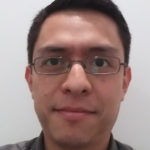
A new in vivo high-throughput model of auditory neuron regeneration | mentored by Michael Bonaguidi, Ph.D.
Ismael Fernández-Hernández got a bachelor’s degree in chemical engineering from ITESO university in Mexico. After spending a couple of years as a process engineer in the food and pharma industry, he decided to focus on cellular-scale, biological processes with the purpose of bring them back to control when they derail in disease. For this, he undertook postgraduate studies in the biosciences: he earned a M.Sc. from the Autonomous University of Madrid, Spain, his PhD from the University of Bern, Switzerland, and did a short postdoctoral stay at the Institute for Research in Biomedicine in Barcelona, Spain. Dr. Fernández-Hernández arrived at USC in 2015 via one of the Provost’s signature postdoctoral scholar initiatives, the USC-CONACYT Postdoctoral Scholars Program. Today, he continues to work with Dr. Michael Bonaguidi as a postdoctoral scholar at the Eli and Edythe Broad Center for Regenerative Medicine and Stem Cell Research at USC.
At USC, Dr. Fernández-Hernández uses the fruit fly Drosophila melanogaster as a model system to analyze adult nervous system plasticity upon diverse forms of injury or functional decline with potential clinical impact. Among these he focuses on hearing loss, one of the most prevalent disabling conditions worldwide, resulting from the death of auditory cells in the cochlea. Unfortunately, humans lack the capacity to replace these cells, making deafness irreversible. By understanding how other organisms can replenish lost auditory cells, development of regenerative therapies for humans can be promoted.
For his project, Dr. Fernández-Hernández aims to take advantage of the intrinsic regenerative capacity and sophisticated genetic tools of the fruit fly to gain insight into auditory function recovery. He will analyze how auditory circuits in the fly are rewired after hearing loss and will establish an advantageous whole-organism platform for genetic and pharmacological screenings to promote auditory neuron protection and regeneration. His long-term goal is to contribute fundamental knowledge to develop restorative therapies for millions suffering of neurodegenerative diseases worldwide.